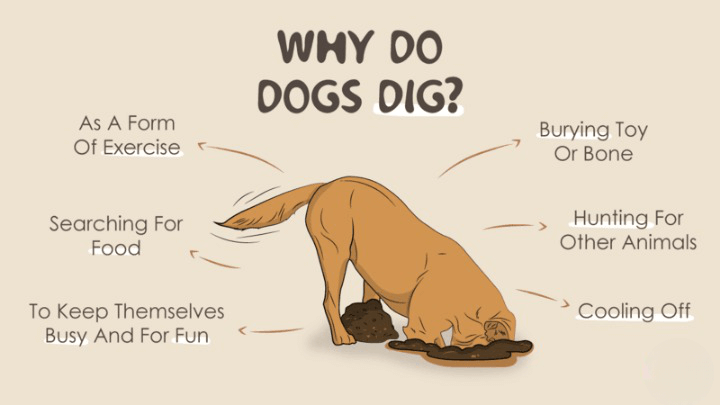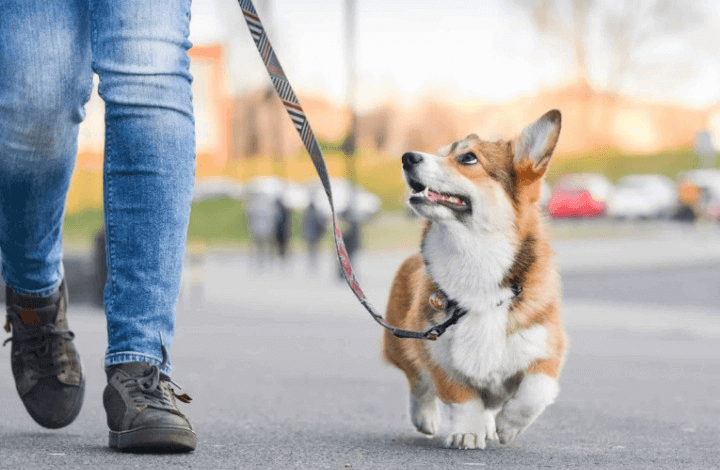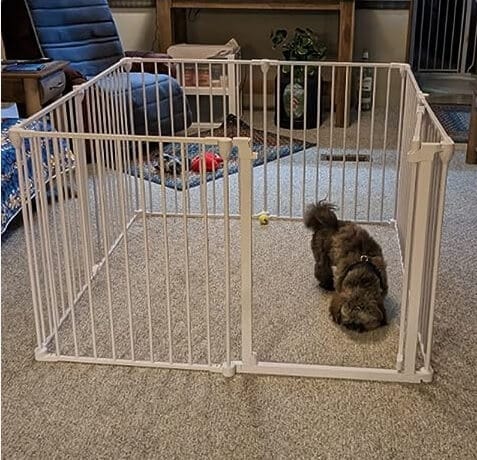In the vast landscape of human-animal companionship, dogs have emerged as loyal and devoted beings, offering unwavering support and unconditional love.
By understanding the reasons behind their dogs digging behavior, providing adequate exercise and mental stimulation, designating a specific area for digging, reinforcing positive behaviors, addressing underlying health issues if present, increasing supervision and limiting access to problematic areas, modifying the environment to discourage digging tendencies, seeking professional help when necessary.
Importantly being patient and consistent throughout the process.While their intentions may be pure and innocent, incessant digging can cause frustration and inconvenience to owners. Owners can effectively overcome this challenge while nurturing the bond between themselves and their faithful friends.
Key Takeaways
- Providing physical exercise and mental stimulation can help prevent of dogs digging behavior.
- Designating a specific area for digging, such as a sandbox, can redirect a dog’s digging instincts.
- Training sessions and obedience classes can redirect a dog’s natural instincts towards alternative activities.
- Reinforcing positive behavior and rewarding dogs for not digging can help develop alternative behaviors.
Understand the Reasons Behind Your Dogs Digging Behavior
Understanding the underlying motivations for your dogs digging behavior is crucial in effectively addressing and preventing this habit. Digging is a natural instinct for dogs, but excessive digging can be problematic. Understanding the root causes of excessive digging behavior in dogs is essential to finding effective techniques to deter dogs from digging.
One common reason behind a dogs digging behavior is boredom or lack of mental stimulation. Dogs that are not provided with enough physical exercise or mental enrichment may resort to digging as a way to release excess energy or alleviate their boredom.
Another possible cause of excessive digging is anxiety or fear. Dogs may dig as a coping mechanism when they feel stressed, anxious, or scared. This behavior provides them with an outlet for their emotions and helps them feel more secure.

Additionally, some breeds are more prone to digging than others due to their genetic predisposition. Breeds such as terriers were historically bred for hunting and burrowing activities, making them more likely to engage in digging behaviors.
To address and prevent excessive digging, it is important to provide dogs with plenty of physical exercise and mental stimulation through activities such as daily walks, puzzle toys, and training sessions.
Creating designated areas where dogs are allowed to dig, such as sandboxes or specific sections of the yard, can also help redirect their natural instinct without causing damage to other parts of the property. Using positive reinforcement techniques like rewards and praise when they refrain from digging in unwanted areas can further reinforce desired behaviors.
By understanding the root causes of excessive digging behavior in dogs, owners can implement effective strategies that address these motivations while ensuring the well-being of their pets.
Provide Sufficient Exercise and Mental Stimulation
Regular walks and playtime are essential for providing dogs with the physical exercise they need. This helps to release their pent-up energy and reduces their desire to dig.
Additionally, incorporating kong dog toys and interactive games can provide mental stimulation, keeping them engaged and entertained. Training sessions and obedience classes not only promote good behavior but also engage their minds, preventing boredom that may lead to dogs digging behavior.
Regular walks and playtime
To effectively curb a dogs digging behavior, ensuring they receive ample exercise through daily walks and engaging playtime is crucial.
Regular exercise offers several benefits for dogs, both physically and mentally. It helps maintain their overall health, prevents obesity, and strengthens their muscles and joints. Dogs that are regularly exercised are also less likely to exhibit destructive behaviors such as digging.

Additionally, providing mental stimulation is equally important in preventing digging behavior. Engaging playtime activities stimulate a dog’s mind and prevent boredom, which can be a major contributing factor to digging. Mental stimulation can be achieved through interactive toys or puzzles that challenge the dog’s problem-solving abilities.
By incorporating regular walks and engaging playtime into a dog’s routine, owners can effectively address the root causes of dogs digging behavior while simultaneously promoting the physical and mental well-being of their furry companions.
Puzzle toys and interactive games
Puzzle toys and interactive games offer a stimulating and engaging way to challenge a dog’s problem-solving abilities, providing mental stimulation that can help deter the unwanted behavior. These activities provide numerous benefits for dogs by keeping their minds active and occupied.

Puzzle toys, such as treat-dispensing puzzles or hide-and-seek games, require dogs to use their cognitive skills to solve problems and obtain rewards. This not only keeps them mentally stimulated but also redirects their attention away from digging behaviors.
Similarly, interactive games like tug-of-war or fetch engage dogs both physically and mentally, providing an outlet for their energy while fostering a positive bond with their owners.
By incorporating these activities into a dogs daily routine, they are less likely to engage in destructive digging behaviors as they are getting the mental stimulation they need.
Training sessions and obedience classes
One effective strategy for addressing unwanted dogs digging behaviors involves incorporating training sessions and obedience classes into their routine.
By engaging in regular training sessions, dog owners can teach their pets appropriate behaviors and redirect their natural instincts towards alternative activities. Training techniques that discourage digging may include commands such as ‘leave it’ or ‘stay’ when the dog shows signs of wanting to dig.
Obedience classes provide structured environments where dogs can learn from experienced trainers and interact with other dogs, promoting socialization and discipline.
Rewards and incentives play a crucial role in this process, as positive reinforcement encourages desired behavior while discouraging undesirable actions like digging. Treats, praise, and playtime are commonly used rewards that reinforce good behavior during training sessions and obedience classes.
Designate a Digging Area
Designating a specific area for your dog to dig can be a highly effective strategy in curtailing their digging behavior, as it provides them with an outlet for their natural instincts while preserving the rest of your yard.
Creating a digging pit and providing digging toys are two key components to implementing this approach successfully.
- Creating a Digging Pit:
- Choose an appropriate location in your yard that is easily accessible for your dog.
- Dig a hole about twice the size of your dog’s body length and line it with sand or loose soil.
- Bury some treats or toys in the pit to encourage your dog’s interest.
- Providing Digging Toys:
- Offer a variety of toys specifically designed for dogs to dig, such as puzzle toys filled with treats or interactive play mats.
- Rotate these toys regularly to keep your dog engaged and prevent boredom.
By designating a designated area and providing appropriate outlets for their digging instincts, you can effectively redirect your dog’s behavior and minimize damage to the rest of your yard.
Reinforce Positive Behavior
To reinforce positive behavior and deter your dog from digging, it is important to reward them for not engaging in this behavior.
Using treats, praise, and attention can be effective methods of reinforcement.
By redirecting their attention to appropriate activities such as playing with toys or engaging in interactive games, you can help them develop alternative behaviors and reduce their inclination to dig.
Reward your dog for not digging

Rewarding your dog for refraining from digging can serve as a positive reinforcement technique that encourages desired behavior and instills a sense of satisfaction in both the owner and the pet. By using reward-based training methods, owners can create an environment where their dogs learn to associate not digging with pleasant experiences.
Here are five benefits of rewarding your dog for not digging:
- Increased bond: Rewarding your dog strengthens the bond between you and your pet, creating trust and establishing a positive relationship.
- Enhanced communication: Positive reinforcement allows for clear communication between owner and dog, facilitating understanding and cooperation.
- Reduced anxiety: Dogs that receive rewards for not digging experience reduced anxiety levels, leading to overall improved well-being.
- Mental stimulation: The act of refraining from digging requires mental effort, providing mental stimulation that keeps dogs engaged and satisfied.
- Improved self-control: Rewarding good behavior reinforces self-control in dogs, helping them resist the urge to dig.
By incorporating reward-based training techniques into daily routines, owners can effectively discourage their dogs from digging while promoting a harmonious relationship.
Use treats, praise, and attention to reinforce good behavior
Incorporating treats, praise, and attention as reinforcements for desired behavior has been shown to significantly increase obedience rates in canines. One study found that dogs who received consistent rewards for good behavior exhibited a 76% improvement in overall obedience compared to those who did not receive reinforcement.
Training techniques that utilize positive reinforcement involve rewarding the dog immediately after they display the desired behavior. This could be done by offering a treat, giving verbal praise, or providing attention such as petting or playing with the dog. By associating these rewards with good behavior, dogs are more likely to repeat it in the future.
Behavioral modification through positive reinforcement is an effective and humane way to stop a dog from digging and encourage desirable behaviors instead.
Redirect their attention to appropriate activities
One effective strategy for managing a dog’s digging behavior is redirecting their attention to more appropriate activities.
By redirecting their behavior, dogs can be encouraged to engage in positive and constructive actions rather than destructive digging. This can be achieved through the following techniques:
- Provide engaging toys and puzzles: Offering interactive toys and puzzles that require mental stimulation can redirect a dog’s focus from digging to solving the activity.
- Encourage physical exercise: Regular exercise helps release excess energy and prevents boredom, which are common triggers for digging behavior.
- Take them on walks or runs: Engaging in daily walks or runs not only keeps dogs physically active but also provides mental stimulation by exposing them to new smells and environments.
- Play fetch or other interactive games: Playing games that involve chasing after toys can help redirect a dog’s energy towards positive activities.
By using these redirection techniques along with consistent positive reinforcement, dogs can learn more appropriate ways to expend their energy, ultimately reducing their inclination to dig.
Address Any Underlying Health Issues
To address any underlying health issues that may be causing a dog to dig, it is important to consult with a veterinarian who can conduct a thorough examination and provide appropriate treatment.
Underlying medical conditions such as skin conditions, allergies, hormonal imbalances, or pain could contribute to the digging behavior in dogs.
A case study involving a Labrador Retriever exhibiting excessive digging behavior revealed that the dog had an untreated skin condition causing discomfort and itching, leading to the digging behavior.
By identifying and treating these underlying health issues, the veterinarian can help alleviate the dog’s discomfort and reduce their inclination to dig.
In addition to medical intervention, behavioral modification techniques may also be recommended to redirect the dog’s attention towards more appropriate activities and discourage the digging behavior.
Seeking professional veterinary advice is crucial in addressing any potential health concerns contributing to a dog’s digging habits.
Distract and Redirect
To stop a dog from digging, it is important to distract and redirect their attention towards alternative activities or toys.
By providing them with engaging and stimulating alternatives, such as puzzle toys or interactive games, their focus can be shifted away from the digging behavior.
Additionally, positive reinforcement techniques can be utilized to encourage the dog to engage in other behaviors that are more desirable.
Provide alternative activities or toys to redirect their attention
Engaging the dog with interactive toys and providing a designated digging area help redirect its attention towards constructive activities. Mental stimulation alternatives are essential in preventing dogs from engaging in destructive behaviors such as excessive digging.

Interactive toys can serve as effective tools to redirect their focus and energy. These toys, designed to challenge the dog’s problem-solving skills and provide mental stimulation, keep them occupied and entertained. By offering these alternative activities, owners can effectively divert their pet’s attention away from digging and towards more appropriate outlets for their energy.
Additionally, providing a designated digging area allows dogs to engage in their natural behavior without causing damage elsewhere. This not only satisfies their instinctual desire to dig but also ensures that they have an appropriate outlet for this behavior.
Use positive reinforcement to encourage them to engage in other behaviors
Positive reinforcement can be utilized as a means to encourage dogs to adopt alternative behaviors and redirect their focus away from digging. By rewarding desired behaviors with treats, praise, or playtime, dogs learn that engaging in those activities is more enjoyable than digging.
Effective ways to redirect dog behavior using positive reinforcement techniques include:
- Teaching basic commands: Training dogs to respond to commands such as ‘sit,’ ‘lie down,’ or ‘stay’ provides them with mental stimulation and redirects their energy towards learning and following instructions.
- Engaging in interactive play: Playing games like fetch or having interactive toy sessions not only keeps dogs physically active but also helps them release excess energy in a positive way.
By incorporating these positive reinforcement techniques for training dogs and providing effective ways to redirect dog behavior, owners can effectively discourage digging while promoting more desirable alternative activities.
Increase Supervision and Limit Access
Increasing supervision and limiting access is an effective strategy to prevent dogs from engaging in unwanted behaviors such as digging. One way to achieve this is by confining the dog to a specific area when unsupervised, ensuring that they are unable to roam freely and engage in digging behavior.
Using baby gates or fencing can also be employed to restrict their access to certain areas where they are prone to dig, preventing them from causing damage.
It is crucial for owners to diligently monitor their dog’s behavior and redirect them whenever necessary, providing alternative activities or toys that will keep them engaged and discourage digging.
Keep your dog in a confined area when unsupervised
To effectively address the issue of a dog’s digging behavior, it is recommended to ensure that the dog is kept within a confined area when left unsupervised. This approach can be effective in preventing dogs from engaging in destructive behaviors and allows owners to have better control over their pet’s actions.
Keeping a dog in a confined area when unsupervised serves several purposes:
- Safety: Confining the dog to a specific area reduces the risk of accidents or injuries that may occur due to unrestricted access.
- Behavior Modification: Limiting the dog’s space can discourage digging behavior by removing opportunities for reinforcement.
- Training Opportunity: A confined area provides an environment where owners can focus on training and redirecting their dog’s attention towards more appropriate activities.
By implementing this strategy, owners can create an environment conducive to training and behavior modification, ultimately curbing their dog’s digging tendencies.
Use baby gates or fencing to restrict access to certain areas
By strategically placing baby gates or fencing, owners can create symbolic barriers that restrict access to certain areas and discourage unwanted behaviors.

Baby gates are a cost-effective and easy-to-install option for limiting a dog’s movement within the house. They can be used to block off specific rooms or sections of the house, preventing dogs from entering areas where they may have a tendency to dig.
Fencing, on the other hand, can be employed in outdoor spaces to create physical boundaries that keep dogs away from designated digging areas.
Additionally, owners may consider enrolling their dogs in training classes specifically designed to address digging behavior. These classes provide professional guidance and teach effective techniques for redirecting a dog’s energy towards more appropriate activities, ultimately curbing their desire to dig.
Monitor and redirect their behavior when necessary
One effective approach is to closely observe and redirect the dog’s actions whenever they show signs of engaging in digging behavior.
By monitoring the dog’s activities, one can identify triggers or patterns that lead to digging and implement appropriate redirection techniques.
This involves understanding canine instincts and providing alternative outlets for their energy and natural behaviors.
For instance, if the dog starts digging near a certain area, redirecting their attention towards a designated digging spot can be helpful.
Providing toys or interactive games that stimulate their mental and physical needs can also divert their focus away from digging.
It is crucial to remain consistent in redirecting the dog’s behavior and offering suitable alternatives to discourage further digging habits.
Through careful observation and redirection, it is possible to modify the dog’s behavior effectively while respecting their natural instincts.
Modify the Environment
Modifying the environment can effectively discourage dogs from digging. Studies have shown that approximately 71% of dog owners who implemented changes to their yard saw a significant reduction in their dog’s digging behavior.
Dog proofing the yard is an essential step in preventing dogs from engaging in this unwanted behavior. Owners can achieve this by ensuring fences are secure and free from any gaps or holes that may entice the dog to dig.
Additionally, using deterrents such as chicken wire buried along the perimeter of flower beds or vegetable gardens can serve as a physical barrier and discourage digging.
Another effective method is providing designated areas for digging, such as sandboxes or specific patches of soil where dogs are allowed to indulge their natural instinct without causing damage elsewhere.
These modifications not only help prevent destructive digging but also promote a safe and harmonious environment for both dogs and their owners.
Seek Professional Help if Needed
Seeking professional assistance from a certified dog behaviorist or trainer can provide valuable insights and strategies to address and manage the underlying causes of excessive digging in dogs. A professional can assess the specific circumstances surrounding the dog’s behavior and develop a personalized plan to modify it effectively. Additionally, they can help identify any potential medical conditions or behavioral issues that may be contributing to the digging behavior.
By seeking assistance, owners demonstrate their commitment to understanding and addressing their dog’s needs. This not only benefits the dog but also promotes a harmonious relationship between the owner and pet.
Nested Bullet Point List:
- Benefits of seeking professional guidance:
- Access to expert knowledge and experience
- Personalized strategies tailored to individual dog’s needs
Be Patient and Consistent
Remaining patient and consistent in addressing the behavior can lead to long-term success in managing excessive digging tendencies in dogs. Understanding triggers for this behavior is crucial.
Dogs may dig out of boredom, anxiety, or even instinctual drive. By identifying the underlying causes, owners can take appropriate measures to address them effectively. Another essential aspect is setting boundaries for the dog. This can be achieved through proper training and reinforcement techniques. Consistently redirecting the dog’s attention to more acceptable behaviors and providing mental stimulation can help prevent excessive digging.
Additionally, creating designated areas where digging is allowed, such as a sandpit or a specific spot in the yard, can satisfy the dog’s natural instincts while preserving the rest of the garden or yard. Implementing these strategies with patience and consistency will encourage positive behavioral changes over time.
| Triggers | Boundaries |
|---|---|
| Boredom | Training |
| Anxiety | Reinforcement |
| Instinctual Drive | Redirection |
See Also
Conclusion
In conclusion, understanding and addressing the root causes of your dog’s digging behavior is crucial to effectively stopping this habit. By implementing a combination of training, exercise, mental stimulation, and providing a designated digging area, you can redirect their energy and fulfill their natural instincts in a positive way.
Remember to be patient and consistent in your approach, offering positive reinforcement for desired behaviors and avoiding punishment for undesirable ones. With time, effort, and love, you can help your furry companion overcome their digging habit and create a happy, harmonious environment for both of you.
If you can’t find the right dog for you to adopt locally, please consider adopting a dog from Bone Voyage Dog Rescue. We’ll fly with your dog to you.
Frequently Asked Questions
Can I punish my dog for digging?
Punishment can be effective in dog training to discourage unwanted behaviors such as digging. However, it is recommended to utilize alternative methods that focus on positive reinforcement, redirection, and providing appropriate outlets for the dog’s natural instincts.
How long does it usually take to stop a dog from digging?
The duration required to address a dog’s digging behavior can vary based on the training methods employed and the consistency of their implementation. Common mistakes in this process often prolong the timeframe needed for successful resolution.
Is it normal for dogs to dig?
It is normal for dogs to dig as it is a natural behavior. Providing a designated digging area can offer benefits such as mental stimulation and physical exercise. Redirecting their digging behavior through training techniques can be effective in managing this behavior.
Can you recommend any specific toys or activities to keep my dog mentally stimulated?
Dog puzzle toys and interactive play sessions are effective ways to keep your dog mentally stimulated. These activities provide mental challenges and encourage problem-solving skills, keeping your dog engaged and entertained for hours.
What are some signs that my dog’s digging behavior may be due to an underlying health issue?
Signs that a dog’s digging behavior may be due to an underlying health issue include excessive or compulsive digging, changes in appetite or weight, lethargy, discomfort or pain while digging, and abnormal behaviors such as whining.
